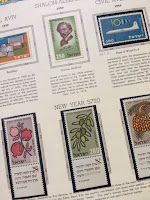 I recently did an interview with a publication where I was asked the question of how I moved from artwork to writing, something the interviewer viewed as two distinct areas. I laughed and said, “Let me make it even more confusing, I came out of a career in finance and was in social work before that.”
I recently did an interview with a publication where I was asked the question of how I moved from artwork to writing, something the interviewer viewed as two distinct areas. I laughed and said, “Let me make it even more confusing, I came out of a career in finance and was in social work before that.” Artwork to writing seemed like one of the smaller steps I've made in my lifetime. They are two different art forms for telling stories and that is what I do. Now I realize that words and images are supposed to draw on opposite sides of our brain and often represent two different types of people. I’m convinced I hopscotch back and forth across my brain with some regularity. An integrated brain often seems to go with being left-handed so perhaps being a lefty in a right-handed world is a factor. I proceeded to share with him my theory that everything I’ve been drawn to has revolved around solving puzzles and telling stories.
His question made me realize that we meet people at one point in time along their personal story arc. We may know two data points about them that we focus upon and that becomes the context in which we view them while in fact the context is much broader. I find that happens often now that I am meeting people after their career has concluded and their kids are grown. I forget that they had a life before that moment. I suppose that is the function of interviewers, to broaden the context. We also are our own editors. I could have decided to stay within the context he knew and not painted the broader picture, excising that incongruent part of my history.
We each have a story arc, one we ourselves are not yet aware of in its totality. Had you spoken to me at an earlier point in my life, I would not have been able to tell you what my latest iteration would have looked like. It has certainly not been linear, although I would argue that there is an internal logic. I’ve often thought of my life like a book, one I wanted to peek ahead in, a bad habit of mine. In my younger days, I used to go to a psychic who gave me glimpses into my possibilities. It was my version of peeking ahead. “Tell me it will all be OK," I was really asking. Then I decided to just live my life and see where it took me and where I took it. It is a bit of a collaboration between us and the universe. We can drive it to some extent, but opportunities and challenges present themselves to which we have to respond. How we respond can take us in very different directions.
Over time we develop an approach to life events. When I was in college I used to debate with my roommate which one of us was the luckiest person. We each believed that good things came to us and that we had some ability to influence those things. I’m not sure where that belief came from at that early age. To some extent it is magical thinking, but it also means that when you expect good things, you typically get them and it becomes a reinforcing philosophy. When I reconnected with my old roommate several decades later we found that we were both living engaged and interesting lives. I suspect the optimism we shared had a lot to do with the outcome. Have you ever noticed how two people can have similar experiences and interpret them in totally different ways? Half-full or half-empty? I think those of us who see the glass as half-full are looking at a broader story arc.
I’ve often described myself as a short-run pessimist and a long-run optimist. In the short-run anything can go wrong, but in the long-run it all sorts out. I’m willing to acknowledge that there are times that life can be pretty miserable, but over time I believe it arcs to self-awareness and gratitude for what we are given. We begin to find the pattern of our life, to see the logic underlying how we live and to appreciate the many gifts that we receive along the way.
I’ve often described myself as a short-run pessimist and a long-run optimist. In the short-run anything can go wrong, but in the long-run it all sorts out. I’m willing to acknowledge that there are times that life can be pretty miserable, but over time I believe it arcs to self-awareness and gratitude for what we are given. We begin to find the pattern of our life, to see the logic underlying how we live and to appreciate the many gifts that we receive along the way.






